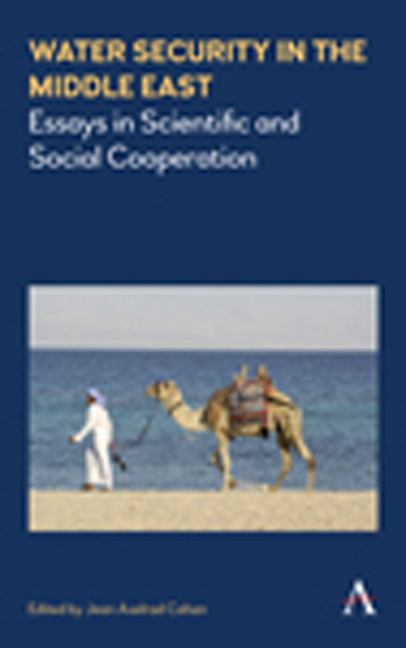Book contents
- Frontmatter
- Contents
- List of Illustrations
- Acknowledgments
- Foreword
- Introduction Water Security in the Middle East: A Role for the Social Sciences and Humanities
- Chapter 1 Cooperation Rules: Insights on Water and Conflict from International Relations
- Chapter 2 Water Security in Transboundary Systems: Cooperation in Intractable Conflicts and the Nile System
- Chapter 3 Water-Demand Management in the Arab Gulf States: Implications for Political Stability
- Chapter 4 A Watershed-Based Approach to Mitigating Transboundary Wastewater Conflicts between Israel and the Palestinian Authority: The Besor-Hebron-Be'er Sheva Watershed
- Chapter 5 The Evolution of Israeli Water Management: The Elusive Search for Environmental Security
- Chapter 6 Adapting to Climatic Variability along International River Basins in the Middle East
- Chapter 7 Water and Politics in the Tigris-Euphrates Basin: Hope for Negative Learning?
- Chapter 8 The Political and Cultural Dimensions of Water Diplomacy in the Middle East
- Notes on Contributors
- Index
Chapter 7 - Water and Politics in the Tigris-Euphrates Basin: Hope for Negative Learning?
- Frontmatter
- Contents
- List of Illustrations
- Acknowledgments
- Foreword
- Introduction Water Security in the Middle East: A Role for the Social Sciences and Humanities
- Chapter 1 Cooperation Rules: Insights on Water and Conflict from International Relations
- Chapter 2 Water Security in Transboundary Systems: Cooperation in Intractable Conflicts and the Nile System
- Chapter 3 Water-Demand Management in the Arab Gulf States: Implications for Political Stability
- Chapter 4 A Watershed-Based Approach to Mitigating Transboundary Wastewater Conflicts between Israel and the Palestinian Authority: The Besor-Hebron-Be'er Sheva Watershed
- Chapter 5 The Evolution of Israeli Water Management: The Elusive Search for Environmental Security
- Chapter 6 Adapting to Climatic Variability along International River Basins in the Middle East
- Chapter 7 Water and Politics in the Tigris-Euphrates Basin: Hope for Negative Learning?
- Chapter 8 The Political and Cultural Dimensions of Water Diplomacy in the Middle East
- Notes on Contributors
- Index
Summary
This chapter examines the role of transboundary river flows in the complex and conflicted relations between states, primarily among Turkey, Syria and Iraq, with passing reference to other countries. The introduction reviews some fundamentals of transboundary surface waters in this area. A second section reviews the international legal framework for management of these water issues, but expresses considerable doubt about the practical impact of this law in this region. The chapter then analyzes the politics of water among all three countries, noting the prevalence of conflict despite some diplomatic agreements on transboundary river flows. In particular it notes the deterioration of water security from 2003 and the US invasion of Iraq, and especially from 2011 and the start of the internationalized Syrian civil war. In this time frame, water continued to be a politicized and securitized subject, and even part of violent politics. Water continued to be manipulated for strategic political purposes, often to the detriment of basic human needs. In this often violent context, efforts to consider access to safe water as a human right, effectively protected by general international law and the laws of war, faded into oblivion. The chapter concludes by asking whether declining water security in the Tigris– Euphrates basin might eventually lead to negative learning, through which major actors might learn from the errors of past policies and discover the need for improved water management in the future.
Introduction
After World War I the gradual emergence of the contemporary states of Turkey, Syria and Iraq resulted in all three legally independent states being inherently interconnected on water issues. About 50 percent of the Tigris River and about 90 percent of the Euphrates River originate in Turkey. While this situation gives Turkey certain advantages in regional water disputes (only about 1 percent of its freshwater originates in foreign areas), it guarantees that Turkey will be subject to demands by others that it be sensitive to equitable water-use and humanitarian considerations in downstream countries. In other words, natural resources in this river basin show a prevalent condition and indicate the probability of disappointment for efforts at multilateral riparian management: Turkey can project more power in hydropolitics than others, making mutually agreed river management difficult or impossible (for the general pattern see Allan and Mirumachi 2010).
- Type
- Chapter
- Information
- Water Security in the Middle EastEssays in Scientific and Social Cooperation, pp. 167 - 184Publisher: Anthem PressPrint publication year: 2017



